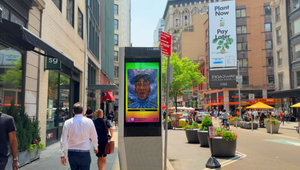
Mastercard Honours Pride Month with 'Acceptance Street' Installation and 'True Name' Cards

Mastercard continues its support of World Pride with the 'Acceptance Street' street sign installation and the introduction of True Name cards.
At the intersection of Gay and Christopher Streets, the street sign continues Mastercard’s #AcceptanceMatters initiative and is a symbol of support for the growing LGBTQIA+ community, 50 years after Stonewall.
The official street sign now expands from Christopher and Gay to now read Christopher and Gay, Lesbian, Bisexual, Transsexual, Queer, Intersex, Asexual, Non-Binary, Pansexual, Two Spirit, + Street. Mastercard worked with the city’s Human Rights Commission to sanction the signs which were then crafted by the same company that builds street signs for New York City. The effort signifies Mastercard’s ongoing commitment to inclusion, diversity and acceptance.

Cheryl Guerin, executive vice president marketing and communications, Mastercard North America, said: “At Mastercard, inclusion and acceptance are what we believe in as a company and promote within our company’s culture. We fully stand by this belief. As we commemorate the 50th anniversary of Stonewall, we want to remind everyone that inclusion and acceptance matter. We have made progress but there is still work to do to ensure that everyone has a way to express their true selves. A day with 100% acceptance would truly be priceless.”
The company has also introduced True Name cards. For many in the LGBTQIA+ community, the name on their credit, debit or prepaid card does not reflect their true identity. As a result, for the transgender and non-binary communities in particular, the card in their pocket can serve as a source of sensitivity, misrepresenting their true identity when shopping and going about daily life.
Mastercard is making a commitment to address this challenge by introducing the True Name card. The company is working with partners to create a product, as well as a sensitive and private process free of personal questions, that will allow for true names, not deadnames, to appear on cards without the requirement of a legal name change. This will ease a major pain point for the transgender and non-binary community.
Mastercard calls on the industry to apply these standards for everyone, ensuring a way for people’s financial products to reflect their true identity.
Overall, nearly one-third (32%) of individuals who have shown IDs with a name or gender that did not match their presentation reported negative experiences, such as being harassed, denied services, and/or attacked. As such, many transgender individuals choose to forego the cost, complexity and anxiety associated with official name and gender changes. Until now, this discrimination has carried through to their cards and payment mechanisms.
In a panel discussion on Monday with the New York City Commission on Human Rights, Mastercard unveiled this initiative and is working to bring the True Name card to market.
“We are allies of the LGBTQIA+ community, which means if we see a need or if this community is not being served in the most inclusive way, we want to be a force for change to help address and alleviate unnecessary pain points,” said Randall Tucker, chief diversity and inclusion officer for Mastercard. “This translates not only for our Mastercard employee community but for our cardholders and the communities in which we operate more broadly. Our vision is that every card should be for everyone.”















